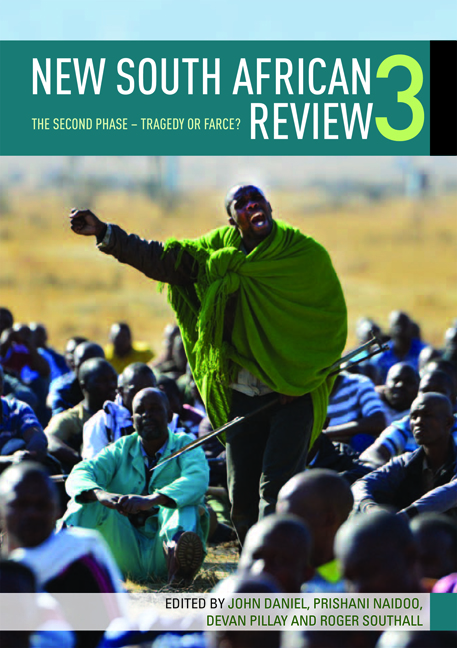Introduction: The second phase – tragedy or farce?
Published online by Cambridge University Press: 31 May 2019
Summary
Hegel remarks somewhere that all great world-historic facts and personages appear, so to speak, twice. He forgot to add: the first time as tragedy, the second time as farce …
(Karl Marx 1852)The Marikana massacre of 16 August 2012 epitomised, in many ways, the tragedy of South Africa's transition to democracy since the heady days of 1994. If, on the one hand, the country is hailed as a ‘miracle’ of reconciliation, constitutional democracy and socioeconomic progress in many areas, on the other hand it is a story of a dream deferred: rising unemployment and work insecurity; widespread poverty amid expanding inequality; increasing crime and corruption; sexual violence; rural decline and displacement; urban homelessness and slummification; state dysfunctionality and public disservice; corporate greed and ecological degradation of various kinds.
Much of this corresponds with the global picture of uneven (or enclave) development, and is captured by chapters in this volume and previous volumes of the New South African Review, as well as by the state's own National Planning Commission, which presents the social deficit as a problem of policy formulation and implementation. Marikana, however, exposes the scenario as a problem of global capitalism that still shows up in South Africa in a racialised form, embedded in a minerals-energy-financial complex based on cheap labour power – the hallmark of apartheid. Despite the coming to power of a democratically elected government supposedly representing the interests of the majority, Marikana has shown how, in the final instance, the state apparatus acts on behalf of a ‘power elite’, with the aid of subordinate classes beholden to its network of patronage, and with the aid of the mainstream media.
The manner in which the African National Congress (ANC) and its Alliance partners responded – closing ranks around the tainted president Jacob Zuma – under the guise of a ‘second phase’ of the ‘national democratic revolution’ to supposedly address persisting historical imbalances, raises the question: has the tragedy of Zuma's first term, which patently failed to address the essential features of the so-called ‘1996 class project’ (namely, neoliberal, enclave development), now become a farce?
- Type
- Chapter
- Information
- New South African Review 3The second phase - Tragedy or Farce?, pp. 1 - 10Publisher: Wits University PressPrint publication year: 2013



